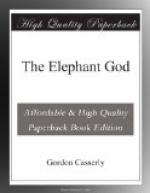A dark pall enveloped the mountains, and over Ranga Duar raged one of the terrifying tropical thunderstorms that signalise the rains of India. Unlike more temperate climes this land has but three Seasons. To her the division of the year into Spring, Summer, Autumn, and Winter means nothing. She knows only the Hot Weather, the Monsoon or Rains, and the Cold Weather. From November to the end of February is the pleasant time of dry, bright, and cool days, with nights that register from three to sixteen degrees of frost in the plains of Central and Northern India. In the Himalayas the snow lies feet deep. The popular idea that Hindustan is always a land of blazing sun and burning heat is entirely wrong. But from March to the end of June it certainly turns itself into a hell of torment for the luckless mortals that cannot fly from the parched plains to the cool mountains. Then from the last days of June, when the Monsoon winds bring up the moisture-laden clouds from the oceans on the south-west of the peninsula, to the beginning or middle of October, India is the Kingdom of Rain. From the grey sky it falls drearily day and night. Outside, the thirsty soil drinks it up gladly. Green things venture timidly out of the parched earth, then shoot up as rapidly as the beanstalk of the fairy tale. But inside houses dampness reigns. Green fungus adorns boots and all things of leather, tobacco reeks with moisture, and the white man scratches himself and curses the plague of prickly heat.
But while tens of thousands of Europeans and hundreds of millions of natives suffer greatly in the tortures of Heat and Wet for eight weary months of the year in the Plains of India, up in the magic realm of the Hills, in the pleasure colonies like Simla, Mussourie, Naini Tal, Darjeeling, and Ootacamund, existence during those same months is one long spell of gaiety and comfort for the favoured few. These hill-stations make life in India worth living for the lucky English women and men who can take refuge in them. And incidentally they are responsible for more domestic unhappiness in Anglo-Indian households than any other cause. It is said that while in the lower levels of the land many roads lead to the Divorce Court, in the Hills all do.
For wives must needs go alone to the hill-stations, as a rule. India is not a country for idlers. Every white man in it has work to do, otherwise he would not be in that land at all. Husbands therefore cannot always accompany their spouses to the mountains, and, when they do, can rarely contrive to remain there for six months or longer of the Season. Consequently the wives are often very lonely in the big hotels that abound on the hill-tops, and sometimes drift into dependence on bachelors on leave for daily companionship, for escort to the many social functions, for regular dancing partners. And so trouble is bred.




